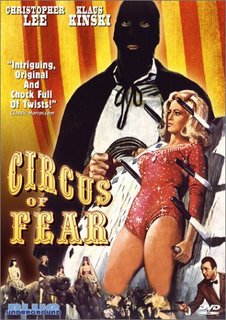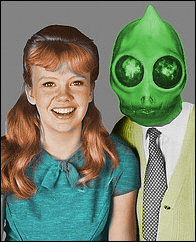Much has been made in comics over the last several years over the concept of secret identities. In DC's Identity Crisis the wife of a super-hero is murdered ostensibly because his identity is public knowledge. In Marvel's awful attempt to cash in at the same time on the ID buzz there was Identity Disc*, which was undoubtedly picked up by readers thinking it was a tie-in. Yet, while the Disk mini was just a painful read Marvel also showed at about the same time that they know how to handle a story about the subject of identities. In the Daredevil series Mat Murdock had his hero persona outed and the story was told like a tabloid celebrity scandal.
Secret identity's require a willing suspension of disbelief to work. In comics they work just fine but in reality they do not. Pre-Infinite Crisis, Superman relied on a subtle, unconscious form of super-hypnotism to make people not connect him to Supes, even though at the time in the comics mythos he was publicly considered to be one of several people who may have been the Man of Steel. As has been said many times, combing your hair differently, slouching and putting on glasses is not a disguise **.
As an example of why secret identities do not work in reality I present this poster from the film Circus of Fear.
Masked identity or not, that's clearly Christopher Lee under that hood. Anyone who actually is familiar with Lee will know it is him. This is why bank robbers get caught. They wear a ski-mask but some pal or acquaintance will turn him in for the reward. This idea of even passing familiarity outing a hero was also effectively pointed out by John Byrne in Marvel's New Universe title The Star Brand #12 (March, 1988). In that issue the hero visits a comic convention and special Con guests John Byrne and Howard Mackie detail the reasons why a costume does little to conceal who a person really is.

In fact, the amateur hero didn't know it but a past acquaintance with questionable motives knew who the Star Brand really was as a civilian just from seeing him on a short television appearance. This petty criminal, knowing the Star Brand was at the Con, went down to confront and presumably blackmail the hero for profit. The scheme didn't work because John Byrne blew up the convention center, destroying priceless comic books ***.
It has become something of a joke in some comics that secret identities exist. Bendis in particular seems determined to out every hero in the Marvel Universe. In an issue of Ultimate Spider-Man, Peter Parker and Mary Jane made a list of everyone who knew that Parker and Spider-Man were one and the same. In a society that treats outrageous criminals or fools as celebrities the perception is that secret ID's may not be needed. Oneof the arguments against the universal exposure of the heroes civilian ID's is that by necessity the hero must become a celebrity and have the resources to protect their family and interests. Tony Stark, being rich and famous has Iron Man as his bodyguard, so no one messes with him. In the real world Bill Gates, also wealthy, has security guards protecting him and his loved ones. Being a celebrity hero will not work for the likes of Peter Parker or Nova, who are permanent losers and who will not be able to afford the resources required to live like their peers. An interesting sub-plot to a comic book line could be that the working-joe heroes are all victims of constant revenge attacks by villains and that their lives are a mess, while their partners on the super-team who have unlimited resources have to deal with their resentment at having it relatively easy by comparison.
* I'd like to see a sequel to Identity Disc done right. While the database would presumably hold the facts of the civilian identities of the heroes that are more or less public like Iron Man, Daredevil or Captain America, it should also contain the "best evidence" for who a hero might be as a civilian. Hairs, DNA evidence from blood left at a fight scene, maps of sightings, etc. A sequel could have the plot that innocent people are being murdered (and to confuse the issue, some 3rd tier disposable heroes are also getting wasted) because someone who has the database is drawing the wrong conclusions as to who a hero is in their civilian identity.
** Lois: "Say Clark, you never seem to be around whenever Superman shows up. I think you are really Superman!"
Clark: "Gosh, Lois...there are 12 million other people in Metropolis and I bet they all weren't around when Supes was beating up those bank robbers, either. By the way, where were you during the fight scene? I didn't see you until after Superman left. Is there something you are hiding YOU ALIEN SHAPE-SHIFTER?!"
*** Geeks also, but no one misses them. I've posted here and elsewhere before about Byrne's (probably justified in many cases) dislike for some fans. Nearly the entire issue of Star Brand #12 seems to me to be his critique on comic readers in general. I'll probably post more on that this week.
Tuesday, December 27, 2005
Why secret identities don't work
Posted by
Sleestak
at
12/27/2005 06:20:00 PM
![]()
![]()
Subscribe to:
Post Comments (Atom)



























So, was that Byrne following up on the threat he posed on the cover of Sensational She-Hulk #1?
ReplyDeleteI think secret identities, like lots of other facets of superheroics, tap into a pretty deep human need.
ReplyDeleteAfter, look at as all out here in the blogosphere, hiding out behind our nommes de blog.
Well, Sure. There are a lot of weirdos out there that may attack us or our loved ones.
ReplyDeleteRe: the bit about evidence about the identities of superheros
ReplyDeleteWhat's interesting is that, of necessity, the DNA and other evidence from incident scenes would tend to be mixed up with evidence from villains, whose real identities might also be unknown (if they've never been arrested).
Thus you could get a superhero id'd as a villain, or vice-versa.
All that said, secret identities can work in the real world. Consider the BTK killer, among others.
Of course, superheros tend to be rather more active, and more publicly active, than criminals with double lives.